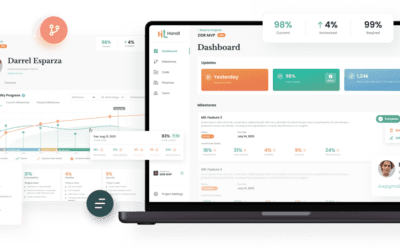Technical due diligence is a term that sounds pretty intimidating. And I won’t lie to you: the process itself is actually pretty intimidating.
But at the end of the day, it’s a lot more beneficial than it is scary. This is especially true if your company is on the path to gaining a new partner or financial investment. Technical due diligence also helps clarify your company’s value proposition to investors and partners, ensuring they understand what sets your product apart and the benefits it offers.
Technology due diligence makes sure all your proverbial ducks are in a row and that everyone has a clear idea of what’s in store for the company. It is typically performed when ownership or resources are changing hands, especially during major corporate events such as mergers, acquisitions, and IPOs.
Let’s take a closer look at technical due diligence, what it means for you and your potential stakeholders, and how you can prepare. The entire process is designed to provide a comprehensive understanding of your company’s technical and business readiness.
What is technical due diligence?
A technical due diligence audit is a comprehensive and independent evaluation of a company’s technology, often referred to as the tech due diligence process. It is a deep dive into a business to examine things like:
- Infrastructure
- Architecture
- Technology stack
- Company’s software
- Software components and different software components
- Applications, including third party software
- Code quality (including code review, general programming style, and verify code)
- Network
- Security (software security, data security, etc.)
- Data storage
- Target company and target company’s products
- Technology assets
Diligence involves reviewing operational processes, internal processes, and project management tools to assess efficiency and readiness. The evaluation also considers quality assurance and software development practices to ensure product reliability and scalability.
This process is usually performed when ownership or resources are changing hands, such as during partnerships, mergers or acquisitions, direct financial investment from entities like angel investors, venture capitalists, private equity firms, initial public offerings, major corporate events, or spin-offs from a parent company. Technical due diligence is often conducted by a third party vendor with expertise across various technical domains.
The main reasons for technical due diligence are to make sure everything “under the hood” is as promised, evaluate the business’s strengths and weaknesses, and identify any risks and opportunities. When evaluating teams, the process reviews the development team, key individuals, and associated costs.
Legal due diligence is also important and is often performed alongside technical due diligence to uncover legal issues and ensure compliance.
The output of the tech due diligence process is a detailed report or diligence report that summarizes findings and recommendations for investors and stakeholders. Comprehensive documentation and proper documentation are essential to support the process and ensure clarity.
Customer feedback and non technical aspects are also considered in the assessment to provide a holistic view of the business. A technology due diligence checklist or due diligence checklist is often used to guide the process and ensure all critical areas are covered.
At its core, technical due diligence makes sure the purchase or investment is sound, for all parties involved.
Key Components of Technical Evaluation
A thorough technical evaluation is at the heart of any successful technical due diligence process. This step goes beyond surface-level checks, diving deep into the technical aspects that drive your business forward. Here’s what a comprehensive technical evaluation typically covers:
- Software Architecture: The foundation of your company’s software systems is scrutinized to ensure it’s built for scalability, maintainability, and future growth. A well-architected system not only supports current business needs but also adapts to new opportunities and challenges, aligning with industry best practices.
- Code Quality: The diligence team will review your codebase to assess its overall health. This includes looking for technical debt, identifying potential security risks, and spotting performance bottlenecks. Clean, well-documented code is a sign of a mature development process and reduces the risk of costly issues down the line.
- Technical Documentation: Comprehensive technical documentation is essential for smooth operations and future development. The due diligence process checks that your documentation is accurate, up-to-date, and covers all critical systems and processes, making it easier for new team members or partners to get up to speed.
- Development Practices: How your team builds and maintains software matters. The evaluation will look at your development practices, such as agile methodologies, code reviews, testing procedures, and CI/CD pipelines. Strong development practices lead to higher quality products and faster, more reliable releases.
- Cybersecurity: Security is non-negotiable. The diligence process assesses your cybersecurity posture, including policies, procedures, and technical controls. This helps identify potential security risks and ensures your company is prepared to defend against threats.
- Intellectual Property: Protecting your proprietary technology is crucial. The evaluation reviews your intellectual property portfolio—patents, trademarks, copyrights—to confirm everything is properly documented and protected, and that there are no risks of infringing on third-party rights.
- Technical Teams: Finally, the skills, experience, and organizational structure of your technical teams are assessed. A strong, well-organized team is essential for executing your business strategy and supporting future developments.
By examining these key components, the technical due diligence process provides a clear, in-depth analysis of your company’s technical strengths and weaknesses. This empowers you—and any potential investors or partners—to make informed decisions and set the stage for a successful deal.
4 ways technical due diligence benefits business owners
Technical due diligence can have several benefits for your company. Let’s look at a few.
1. It’s a verification process
Due diligence is a form of verification in a few different ways. For starters, it verifies to your potential partners or investors that you are what you say you are. A diligence checklist is used to systematically verify key areas such as security, software architecture, scalability, and risk assessment during the process. This brings confidence and trust to whatever deal you’re making. (After all, many of these people and businesses have learned the hard way that just because a team says something is true does not always mean it’s true.)
It also verifies that your business is a well-oiled machine, with all the parts and pieces in all the right places to ensure you have the potential to be successful in the long run. In addition, diligence involves evaluating both technical and operational readiness, giving peace of mind not only to your future stakeholders but also to you and your team.
2. It brings in new knowledge and perspectives
Technical due diligence is often performed by a third party vendor specializing in tech due diligence. By bringing in external experts, you’re injecting new knowledge and perspectives into the business evaluation process.
This makes it likely that new things will be brought to your attention, like issues you may not have seen, effective strategies you may not have implemented, or innovative ideas you may not have considered. And if any problems or inefficiencies are uncovered during the process, you’ll have expert insights on what steps you can take to fix them.
3. It touches on the classic SWOT analysis
Beyond basic verification, technical due diligence can be a great way to evaluate where you are in your industry, market, and niche, as well as in comparison to your competitors. You can think of it like a classic SWOT analysis:
- Strengths: Which internal attributes and characteristics give you a competitive advantage? These can include anything from a strong brand to unique services to innovative processes.
- Weaknesses: Which factors might hinder the success of your brand or apps? These could be areas where your company lacks resources or skills, or faces operational challenges.
- Opportunities: What can you leverage to benefit any of your offerings or your brand as a whole? This could include emerging markets, tech advancements, or trends that align with your company’s strengths.
- Threats: Are there any external factors that pose potential risks or challenges? These could include economic downturns, regulatory changes, or competition that might impact your success.
While technical due diligence isn’t the same thing as a SWOT analysis, you’ll be weighed out against the market and other companies — so you’ll uncover SWOT insights whether or not it was the original plan.
4. It improves operational efficiency
When someone is diving into every nook and cranny of your business, they want you to succeed just as much as you do. They want you to be as operationally efficient as possible, because this paves the way for maximum revenue and ultimate success.
Rest assured that any inefficiencies, issues, or bottlenecks will be uncovered and examined. Whether it’s outdated software, redundant processes, or underutilized technology, it’s likely that they’ll be flagged for improvement. During technical due diligence, a thorough review of operational processes and internal processes helps identify areas for streamlining and increased efficiency. In this way, technical due diligence helps you streamline operations and improve your overall agility.
Data Protection and Security: Safeguarding Your Business
In today’s digital landscape, data protection and security are more than just technical requirements—they’re fundamental to building trust with customers, investors, and partners. During the technical due diligence process, your company’s approach to data security and protection will be closely examined. Here’s what you need to know:
- Data Security: Implementing strong security measures like encryption, firewalls, and access controls is essential to protect sensitive information from unauthorized access or theft. The diligence process will verify that your data security protocols are robust and up to date.
- Compliance: Adhering to data protection regulations such as GDPR or CCPA is a must. The due diligence team will check for compliance gaps and ensure your company meets all relevant legal requirements, reducing the risk of costly penalties or reputational damage.
- Data Backup and Recovery: A solid backup and disaster recovery plan is critical for business continuity. The evaluation will look at your processes for backing up data and recovering from potential data loss, ensuring you can quickly bounce back from unexpected events.
- Incident Response: Having a clear incident response plan in place means your team can act fast in the event of a data breach or cyberattack. The diligence review will assess your readiness to detect, respond to, and contain security incidents.
- Third-Party Risk Management: Many companies rely on third-party vendors and service providers. The due diligence process will evaluate how you manage these relationships to ensure they don’t introduce new security risks to your systems or data.
- Employee Education and Awareness: Human error is a common cause of security incidents. Training your team on data protection best practices helps prevent mistakes and reduces the risk of malicious activity.
- Continuous Monitoring: Ongoing monitoring of your systems and data is vital for detecting and addressing potential security threats. The diligence team will look for evidence of proactive monitoring and timely remediation of vulnerabilities.
By prioritizing data protection and security throughout the technical due diligence process, you not only safeguard your business but also demonstrate your commitment to protecting the interests of all stakeholders. This focus on security is a key factor in building confidence and ensuring the long-term success of your company.
Tips to prepare your company for a technical due diligence checklist
Here are some things to keep in mind as your time on the chopping block approaches (am I helping the intimidation factor?).
- Prepare a technology due diligence checklist or due diligence checklist to guide your evaluation process. Ensure you have comprehensive documentation, including code repositories, architecture diagrams, and software licenses, to facilitate a thorough review.
- Conduct your own internal audits to proactively identify and address potential weaknesses or inefficiencies in your software systems — your future stakeholders will appreciate it.
- Protect your intellectual property (IP): confirm that patents, copyrights, and other IP assets are well-documented, up-to-date, and legally secure.
- Make sure your data security measures are compliant, including how customer data is handled, stored, and protected in your systems.
- Do the same for other types of regulatory compliance, like software licensing agreements and any relevant certifications.
- Present a clear technology roadmap that outlines your future plans for development and growth, including potential updates, enhancements, or new features.
- Train your team so they’re ready to provide any necessary documentation and do well in interviews related to their role and expertise.
- Be prepared to provide financial documentation and discuss budgeting for future development and maintenance.
The benefits outweigh the intimidation
Savvy potential investors or corporate partners will embrace technical due diligence, and you don’t need to be scared of it. It may feel overwhelming, but stay focused on the outcome. In the end, it will give you a stronger understanding of where you stand in the market and what you can do to improve.
You’ll also gain the trust of your potential stakeholders, showing them that you’re as awesome as you promised during your pitches, presentations, and negotiations.
As long as you’re prepared, you’ve got much more to gain than you have to lose.
Video
Read more: how to turn your B2B mobile app concept into reality




